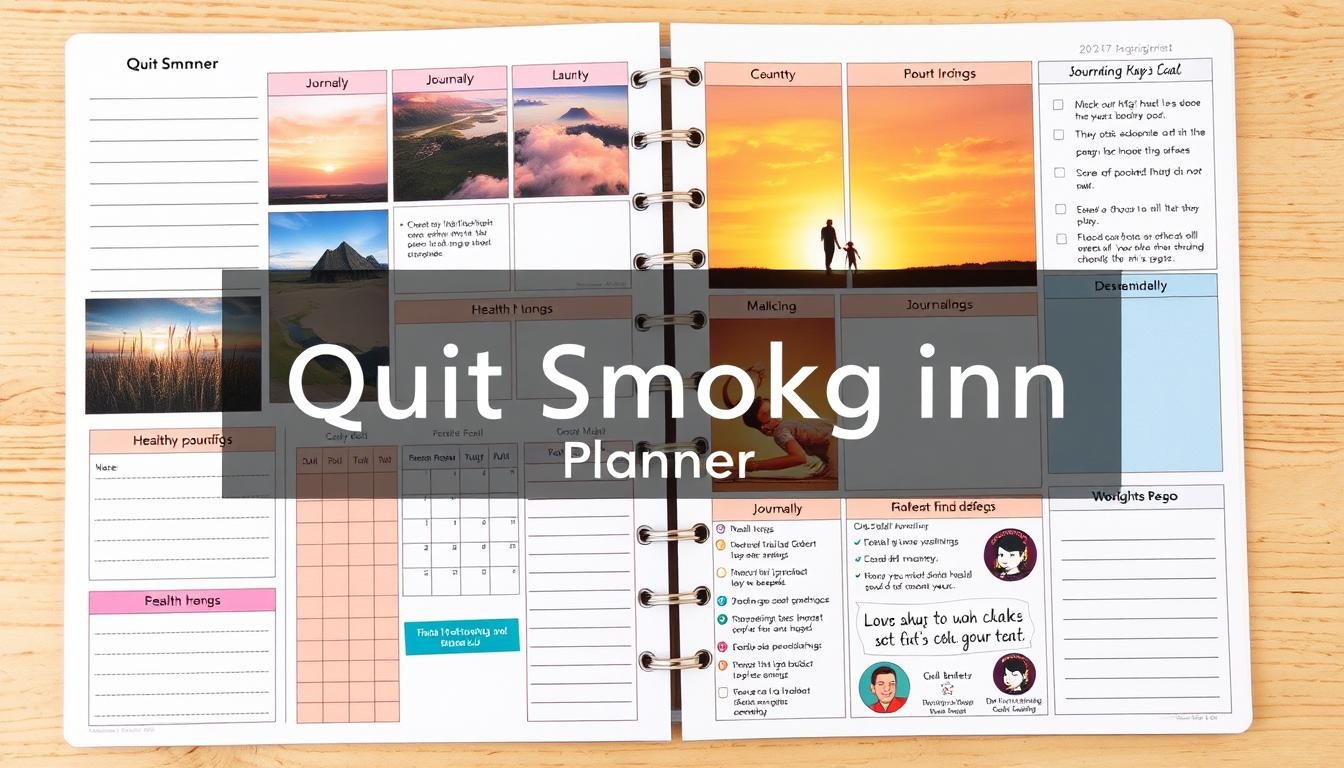Can you beat the odds of quitting smoking alone? This question makes us think about the tough journey of quitting. It’s not just about stopping smoking; it’s a test of your mind, heart, and social connections. About 40% of smokers who quit say support from others was key to their success. This shows that having people around you can really help you win this battle1.
While some try to quit alone, knowing the value of support is crucial. Studies show that women with support from partners are more likely to quit smoking. This shows how important relationships are in making big changes1. As you think about quitting, it’s important to know what help is out there, especially if you don’t have a quit smoking partner.
Key Takeaways
- Support from friends and family is crucial during the quitting process.
- The absence of a quit smoking partner can pose both benefits and challenges.
- Distractions and celebrations of milestones are beneficial in the cessation journey.
- Different types of relationships influence your quitting experience.
- Understanding your own triggers and cravings is vital for success.
The Importance of Support in Quitting Smoking
Quitting smoking is tough. Support is key to success. Research shows that many smokers try to quit but fail, showing how hard it is2. You can get support from family, friends, and community groups.
Understanding Support Systems
Knowing good support systems is crucial. Smokers with support from loved ones do better in quitting3. Support can be emotional or practical, helping with cravings and withdrawal. Celebrating small victories can keep you motivated2.
Impact of Social Support on Smoking Cessation
Support from others is very important. Those who feel they have strong support are more likely to quit and stay quit3. About 70% of smokers want to quit, showing they’re ready to overcome addiction2. Support helps deal with mood swings and irritability from quitting2.
Can You Quit Smoking Alone?
Quitting smoking alone is a choice some make. It has its own set of benefits and challenges. One advantage is the chance to take full control of your quitting journey. You can create a plan that fits your life, without outside influence.
Having smoke-free areas at home and in your car helps keep you focused. It shows how important a supportive environment is4. Changing how you see yourself, as a non-smoker, also helps. It makes you more determined to stay smoke-free5.
Benefits of Going Solo
- Increased Control: You can develop and follow a quitting strategy that suits your lifestyle without external influences.
- Self-Reflection: This journey often encourages deeper self-examination of your habits and triggers.
- Flexible Timing: You decide when and how you quit, allowing for a more personalized timeline.
- Adaptability: Overcoming cravings can be managed individually by utilising nicotine replacement products, preparing you to resist temptation4.
Challenges of Quitting Without Help
Quitting alone can be tough. You might feel isolated, which can make it hard to stay motivated. Managing cravings without support is a big challenge, affecting your chances of success.
Success rates vary a lot. For example, 76% of couples quit together, but only 31% if one partner keeps smoking6. Also, avoiding alcohol can help you avoid situations that might make you want to smoke again4.

Understanding the Role of a Quit Smoking Partner
Having a quit smoking partner can change your journey to stop smoking. This person, known as your quit smoking mentor or buddy, offers crucial support and encouragement. They help you stay on track and deal with challenges when quitting.
What is a Quit Smoking Partner?
A quit smoking partner is someone who goes through the journey with you or supports you. They can be a friend, family member, or colleague who gets the quitting struggle. Having a smoking cessation buddy makes the journey less lonely by sharing experiences.
Types of Support from a Quit Smoking Partner
Your quit smoking partner can give different kinds of support that help you succeed:
- Emotional Encouragement: They can boost your mood during hard times.
- Accountability: Regular meetings keep you focused on your progress.
- Shared Strategies: Talking about ways to handle cravings can improve your plan.
Studies show that having a quit smoking partner can greatly increase your chances of quitting7. Doing smoke-free activities together, like biking or eating at smoke-free places, strengthens your commitment7. Research also finds that cravings are short-lived, making it key to find distractions during these moments7.
Alternatives to a Quit Smoking Partner
Not having a traditional quit smoking partner doesn’t mean you’re alone. Many digital support platforms offer help 24/7. They provide the support you need to quit smoking.
Online Support Groups and Communities
Online support groups and communities are great. They let you connect with others who face similar challenges. This can make you feel understood and part of a community.
Statistics show that almost 70% of adult smokers want to quit8. These groups share experiences and strategies. They help keep you motivated. Remember, most people try to quit several times before they succeed9.
Using Mobile Apps for Support
Mobile apps can also help you quit smoking. They offer features like tracking your progress and sending motivational quotes. These apps remind you of your goals and help manage cravings.
Studies show that distractions can help. Just 10 minutes of distraction can reduce the urge to smoke10. Many apps connect you with support hotlines like 800-QUIT-NOW. This helps you stay on track with your quit plan10.

Strategies for Success Without a Quit Smoking Partner
It’s possible to quit smoking on your own. You can make a detailed plan with clear goals and milestones. Having these helps keep you motivated for the long haul. It’s also important to celebrate your small wins to stay on track.
Setting Clear Goals and Milestones
Setting clear, achievable goals is key in your quit plan. Here are some steps to follow:
- Define your quit date: Pick a specific date to stop smoking.
- Identify triggers: Make a list of what makes you want to smoke and find ways to avoid them.
- Set milestones: Break your journey into smaller goals, like one week, one month, and three months without smoking.
- Reward yourself: Treat yourself to something small for each milestone to celebrate your success.
Developing a Personal Quit Plan
Your quit plan should include many elements to help you. It might include:
- Utilizing resources: Use quitlines, online forums, or apps for help.
- Tracking progress: Keep a journal or use apps to track your journey and any hurdles.
- Seeking support: Join online groups to share your story and get support.
- Employing mindfulness techniques: Try meditation or deep breathing to fight cravings.
With determination and the right strategies, you can quit smoking on your own. This approach builds your confidence and helps you fight addiction11.
Seeking Professional Help: Quit Smoking Coaches and Counselors
Getting help from a quit smoking coach or counselor can really help you quit. They give you personal advice and strategies that fit your needs. This can make quitting easier and more likely to succeed.
Benefits of a Quit Smoking Coach
A quit smoking coach is key in helping you quit. They offer:
- Personalized Plans: Custom strategies that fit your life and triggers.
- Emotional Support: Help with the emotional challenges of quitting.
- Coping Strategies: Ways to deal with cravings and symptoms like irritability and anxiety
- Accountability: Regular meetings to keep you motivated and on track.
12.
Finding the Right Tobacco Addiction Counselor
Finding the right counselor takes some thought. Look at:
- Qualifications: Make sure they’re certified and have experience in quitting smoking.
- Treatment Approaches: Choose someone whose methods you like, like counseling or medication
- Compatibility: A good counselor should feel like a good match for you.
- Accessibility of Resources: Check if they offer tools like quitlines and apps
12.
13.

Choosing a qualified coach or counselor boosts your chances of quitting for good. They help manage withdrawal and set goals for a healthier life1214.
Utilizing Smoking Cessation Programs
Looking to quit smoking? Structured programs can really help. They offer many options like group therapy, nicotine replacement, and behavioral changes. These are designed to support you in quitting.
Types of Smoking Cessation Programs Available
There are many smoking cessation programs out there. They use different methods to help you stop smoking. Here are a few common ones:
- Group Therapy: Group sessions provide a supportive environment with others facing similar challenges.
- Nicotine Replacement Therapies: Patches, gums, and lozenges help reduce withdrawal symptoms.
- Behavioral Interventions: Techniques like motivational interviewing and problem-solving strategies aim to change smoking behaviors.
How to Choose the Right Program for You
Choosing the right program is important. Consider what you need and what you prefer. Look at these key factors:
- Cost: Check your budget and what financial help is available for programs.
- Location: Think about how easy it is to get to the program.
- Professional Guidance: Decide if you want a program led by professionals or one you can do on your own.
Studies show mixed results on the impact of partner support in these programs. Some found it helpful, while others didn’t see long-term benefits (Partner Support Research)15. Think about these points when choosing a program that fits your lifestyle.
Coping Mechanisms for Cravings and Triggers
Starting your journey to quit smoking means learning to handle cravings and triggers. First, find out what triggers you. These can be emotional stress, social situations, or habits tied to smoking. For example, feeling anxious, bored, or lonely can be triggers16.
Knowing these feelings helps you prepare for cravings.
Identifying Personal Triggers
Many triggers for smoking cravings come from social events or daily routines. Cravings can start soon after your last cigarette, getting stronger over time17. Spotting these situations lets you plan how to deal with them. For instance, if coffee makes you want a cigarette, try a different drink.
Healthy Distraction Techniques
Good ways to fight cravings include staying active and using healthy distractions. Try yardwork or sports to distract yourself and feel better18. Replace cigarettes with gum or a stress ball to keep your hands busy18. Remind yourself you can resist cravings with positive thoughts.

Emotional Aspects of Quitting Smoking
Quitting smoking can lead to big emotional changes. You might feel mood swings and anxiety because of withdrawal. Knowing these feelings are normal is key to handling them well. Your mood can change a lot, affecting your quitting journey.
Managing Mood Swings and Anxiety
When you try to stop smoking, mood swings and anxiety can happen. Understanding these emotional effects helps you find quit smoking guidance. Using mindfulness, exercise, and relaxation can help with these feelings.
Having a support system, like smoking addiction help, is also important for your emotional health.
The Psychological Benefits of Quitting
Being smoke-free brings many mental benefits. People often feel better about themselves and their mood improves. Studies show that being with supportive people can help you stay smoke-free longer19.
Having a supportive partner is especially helpful. Their support is key during your quitting journey20. A strong support network helps you stay emotionally strong, giving you the stop smoking support you need.
| Emotional Challenges | Management Strategies |
|---|---|
| Mood Swings | Mindfulness and Relaxation Techniques |
| Anxiety | Physical Exercise |
| Low Self-Esteem | Building a Support Network |
Celebrating Milestones in Quitting
Celebrating your quitting milestones is key to staying motivated. Acknowledging each success, like being smoke-free for a week or a month, boosts your quit smoking accountability. Dr. J. Taylor Hays says every tobacco-free moment is a victory, showing how these small wins add up to quitting success21.
Why Celebrating Progress Matters
Celebrating your progress does more than just lift your spirits. It also creates a supportive atmosphere. Studies show couples quitting smoking together are six times more likely to succeed than those going it alone22. This highlights the value of having a support network, whether it’s a partner or a community of quitters.
This support helps fight feelings of loneliness and anxiety that often come with quitting.
Ideas for Celebrating Your Success
Here are some ways to celebrate your quitting milestones:
- Reward yourself with small treats or experiences.
- Engage in activities that promote a smoke-free lifestyle.
- Create a personal celebration ritual to mark each milestone.
Thousands of people in the EX Community celebrate by burning millions of cigarettes at bonfires. This shows the power of achievement in quitting21. You can draw inspiration from these celebrations and make them part of your life. Using apps to track your progress can help, allowing you to set rewards and celebrate nicotine-free days23. Every day without tobacco is a milestone worth celebrating.

The Myths About Quitting Without Support
Many myths surround quitting smoking. One big one is that you need a partner to quit. But, many people have quit on their own. These myths can make quitting harder.
Common Misconceptions about Solo Quitting
Some think quitting alone is impossible. But, many have quit without a partner. This shows that determination can work. Every effort, with or without a partner, helps you learn to handle cravings.
Realities of Independence in Smoking Cessation
Many try to quit several times before they succeed. This shows the importance of not giving up. With the right support, quitting alone can work. Setting a quit date and knowing your triggers are key steps.
Quitting smoking greatly lowers health risks. For example, heart attack risk drops by half in a year. With online forums and apps, you can find the right help for you.
| Aspect | Myth | Reality |
|---|---|---|
| Need for a Partner | You must have a quit smoking partner. | You can successfully quit on your own. |
| Validity of Solo Efforts | Solo efforts are less valid. | Every attempt to quit is significant. |
| Health Risks | Quitting doesn’t reduce health risks. | Quitting significantly lowers health risks. |
Knowing the truth about quitting smoking empowers you. It prepares you for the challenges ahead. Learning and using available resources can help you succeed.
For more information on quitting smoking and myths, check out credible sources like the2425, and26 mentioned above.
Resources for Quitting Smoking Independently
Quitting smoking can feel like a solo journey. But, you don’t have to face it alone. There are many smoking cessation resources to help you. You can find both books and online tools that offer quit smoking guidance.
Books and Literature on Smoking Cessation
Books like Freedom From Smoking®: The Guide to Help You Quit Smoking are very helpful. They cost just $5.99 and share stories of success. They also give you strategies to quit.
Reading about others who have quit can also motivate you. It’s a great way to stay inspired when quitting gets tough.
Helpful Websites and Online Tools
The American Lung Association’s Freedom From Smoking® program is a great resource. It connects you to a supportive community with over 41 years of experience. This community has helped over a million people quit smoking.
It offers quitlines and mobile apps. These tools give you encouragement and advice as you quit.

Online programs can really help you quit smoking. Studies show that smokers who get advice from many doctors are more likely to try quitting. This shows how important it is to use different resources to help you stay motivated and focused2728.
Conclusion
Quitting smoking is tough, but many people do it on their own. Every year, tobacco kills nearly 5 million people worldwide29. This shows how important it is to help people stop smoking.
Studies say that having a supportive partner can really help. They found that people in quitting programs often say their partner’s support was key. This support can make them more likely to stay smoke-free for good3031.
You can still quit smoking even without a partner’s help. Setting goals and making a quit plan can help you beat nicotine addiction. Remember, quitting alone doesn’t mean you’re lonely. It’s about staying focused on your goals29.
Knowing you have resources and the strength to overcome this challenge is empowering. Use all the support you can find and focus on growing personally. This will help you reach your goal of quitting smoking30.
FAQ
Can I quit smoking successfully without a partner?
What types of support can a quit smoking partner provide?
Are online support groups effective for quitting smoking?
How can I develop a personal quit plan?
What should I expect emotionally while quitting smoking?
What are some healthy distraction techniques to manage cravings?
Can seeking professional help enhance my quitting process?
What are some common myths about quitting smoking alone?
Where can I find resources for quitting smoking independently?
How can I celebrate my quitting milestones effectively?
Source Links
- https://women.smokefree.gov/your-relationships/relationship-quitting
- https://smokefree.gov/help-others-quit/how-to-support-someone-quitting
- https://pmc.ncbi.nlm.nih.gov/articles/PMC4751868/
- https://pivot.co/blog/how-to-quit-smoking-when-you-live-with-a-smoker
- https://www.lung.org/blog/how-to-quit-smoking-when-living-with-a-smoker
- https://www.tobaccoinduceddiseases.org/Smoking-cessation-better-together-A-retrospective-cohort-nstudy,162367,0,2.html
- https://utswmed.org/cancer/support-services/education-resources/support-loved-one-quit-smoking/
- https://utswmed.org/cancer/community-outreach/join-a-conversation/beating-nicotine-together/new-ways-to-quit-smoking/
- https://www.cancer.org/cancer/risk-prevention/tobacco/helping-a-smoker-quit.html
- https://www.mayoclinic.org/healthy-lifestyle/quit-smoking/in-depth/nicotine-craving/art-20045454
- https://www.cdc.gov/tobacco/campaign/tips/partners/index.html
- https://www.mentalhealth.va.gov/quit-tobacco/how-to-quit.asp
- https://www.mentalhealth.va.gov/quit-tobacco/
- https://www.cancer.org/cancer/latest-news/how-to-quit-smoking.html
- https://www.tobaccopreventioncessation.com/A-couples-focused-intervention-for-smoking-cessation-during-npregnancy-The-study,89926,0,2.html
- https://smokefree.gov/challenges-when-quitting/cravings-triggers/know-your-triggers
- https://www.cancer.gov/about-cancer/causes-prevention/risk/tobacco/withdrawal-fact-sheet
- https://www.cancer.org/cancer/risk-prevention/tobacco/guide-quitting-smoking/quitting-smoking-help-for-cravings-and-tough-situations.html
- https://www.cmu.edu/dietrich/psychology/stress-immunity-disease-lab/scales/pdf/smoking90.pdf
- http://jag.journalagent.com/eurasianjpulmonol/pdfs/EJP_19_2_100_103.pdf
- https://truthinitiative.org/research-resources/quitting-smoking-vaping/key-successfully-quit-smoking-and-stay-quit
- https://oneyousurrey.org.uk/smoking/how-to-help-a-loved-one-quit-smoking/
- https://truthinitiative.org/research-resources/quitting-smoking-vaping/how-support-someone-their-quit-vaping-journey
- https://pmc.ncbi.nlm.nih.gov/articles/PMC1449389/
- https://www.summahealth.org/flourish/entries/2024/01/addressing-myths-of-quitting-tobacco
- https://smokefree.gov/tools-tips/how-to-quit/busting-nrt-myths
- https://www.lung.org/help-support/corporate-wellness/help-employees-stop-smoking
- https://www.haleonhealthpartner.com/en-us/respiratory-health/conditions/smokers-health-conditions-home/smoking-cessation/non-prescription-smoking-cessation/
- https://jag.journalagent.com/z4/download_fulltext.asp?pdir=eurasianjpulmonol&plng=eng&un=EJP-97759
- https://link.springer.com/article/10.1080/10705500802365607
- https://pmc.ncbi.nlm.nih.gov/articles/PMC6326744/


